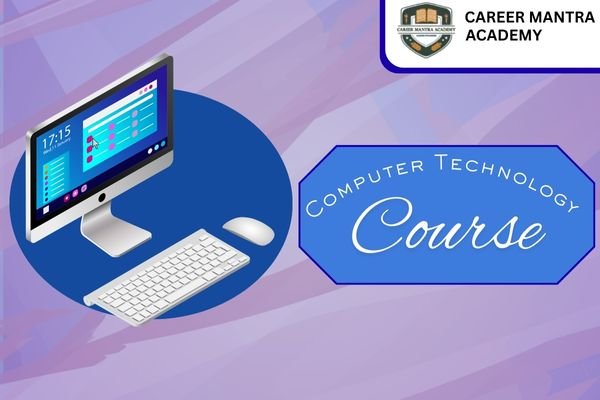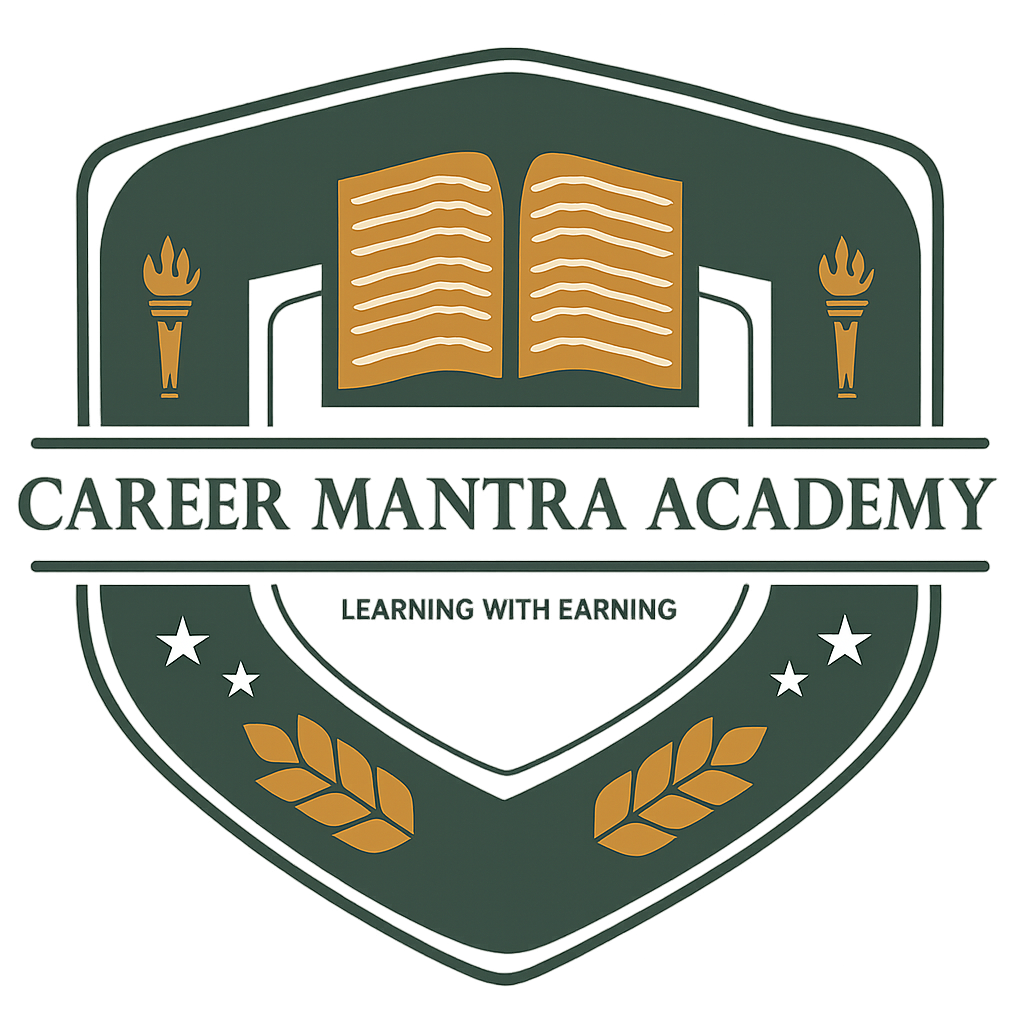
For Applying Computer Course Click Here…
What is a Computer Technology Course?
A computer technology course is a planned programme that teaches students the skills and knowledge they need to understand, use, and manage computer systems and digital technologies. It encompasses both the theoretical and practical aspects of computing, including hardware, software, networking, programming, and information systems. The course is designed to equip students with the technical skills necessary to solve real-world problems and prepare them for careers in the technology field, which is continually evolving.
The course material can be different depending on whether it is a diploma, undergraduate, postgraduate, or certification course. For beginners, it usually covers the basics, like how to use computers, the internet, and basic programming. Students at higher levels look into more specific fields like software development, cloud computing, cybersecurity, database management, and artificial intelligence.
The main goal of a computer technology course is to help students connect what they learn in class with what they do in the real world. These classes also stress being able to solve problems, think critically, and be flexible, which are all very important in the digital world that changes so quickly.
A computer technology course isn’t just about learning how to use computers. It’s also about building a career path in technology that can lead to jobs in many fields, such as IT, healthcare, finance, education, and e-commerce.
Why Should You Choose a Computer Course with Career Mantra Academy?
Taking a computer course at Career Mantra Academy is a smart way to start a successful career in technology. The academy is known for its courses that combine theory with hands-on learning and are relevant to the industry. Students learn how to use modern technologies that are in high demand, like programming, networking, cybersecurity, and more.
Career Mantra Academy also offers personalised help, teachers with a lot of experience, and course materials that are up to date with what is expected in the field. The academy has flexible learning options, such as classroom and online programmes, for both beginners and professionals who want to improve their skills. Career Mantra Academy makes sure that students are ready for jobs and confident that they can succeed in the IT field by focusing on career growth and placement help.
What Skills Do You Learn in a Computer Course?
A computer course equips learners with a wide range of technical and professional skills that are essential in today’s digital world. Some of the key skills you gain include:
- Basic Computer Literacy – Understanding operating systems, file management, and commonly used applications.
- Programming Skills – Learning languages such as Python, Java, C++, or HTML for software and web development.
- Networking Knowledge – Understanding how computer networks, servers, and the internet function.
- Database Management – Gaining expertise in handling, organizing, and analyzing data using tools like SQL.
- Cybersecurity Awareness – Learning how to protect systems, networks, and data from online threats.
- Software Development – Designing, developing, and testing applications for business or personal use.
- Problem-Solving & Logical Thinking – Developing analytical skills to find solutions using technology.
- Digital Communication Skills – Using email, video conferencing, and collaborative tools effectively.
- Office Productivity Tools – Proficiency in MS Office, Google Workspace, and similar applications.
- Emerging Technologies – Exposure to AI, cloud computing, and data science, depending on the course level.
Who Can Apply for a Computer Technology Course?
Depending on the level of study, a lot of different people can take a computer technology course. Students who have finished 10th or 12th grade can apply for a diploma or undergraduate programmes that focus on building strong foundations. Graduates from any field, but especially those who studied science, commerce, or the arts and have computer skills, can also take certification or advanced diploma courses to improve their skills.
People who work in IT, software development, or digital technologies and want to move up in their careers can sign up for short-term or online certification courses. Even people who have never worked with computers before can start with basic computer training programmes. Anyone interested in technology and learning online can sign up for a computer technology course.

Which 12 Courses are Career Opportunities in the computer course?
| Course Name | Average Annual Salary (India) | Career Opportunities |
| 1. Diploma in Computer Applications (DCA) | ₹2 – 4 LPA | Data Entry Operator, Computer Operator, IT Support Assistant |
| 2. B.Sc. in Computer Science | ₹3 – 6 LPA | Software Developer, System Analyst, IT Consultant |
| 3. BCA (Bachelor of Computer Applications) | ₹3 – 7 LPA | Web Developer, Programmer, Database Administrator |
| 4. MCA (Master of Computer Applications) | ₹5 – 10 LPA | Software Engineer, App Developer, Project Manager |
| 5. Diploma in Web Development | ₹2 – 5 LPA | Front-End Developer, Back-End Developer, Web Designer |
| 6. Diploma in Networking | ₹3 – 6 LPA | Network Engineer, System Administrator, IT Support Specialist |
| 7. Cybersecurity Course | ₹5 – 12 LPA | Cybersecurity Analyst, Ethical Hacker, Security Consultant |
| 8. Data Science Course | ₹6 – 15 LPA | Data Scientist, Business Analyst, Machine Learning Engineer |
| 9. Cloud Computing Course | ₹6 – 14 LPA | Cloud Engineer, Solutions Architect, Cloud Consultant |
| 10. Artificial Intelligence & Machine Learning | ₹7 – 18 LPA | AI Engineer, ML Developer, Research Scientist |
| 11. Diploma in Graphic Designing | ₹2 – 5 LPA | Graphic Designer, UI/UX Designer, Creative Specialist |
| 12. Software Engineering Course | ₹5 – 12 LPA | Software Engineer, Application Developer, QA Tester |
What is the Future Scope of the Learning Computer Technology Course?
There is a high demand for professionals who know a lot about computers. There are a lot of job openings for people with skills in new fields like artificial intelligence, cloud computing, cybersecurity, and data science.
Learning about computers not only gets you ready for your current job, but it also makes sure you stay up to date as new technologies like robotics, blockchain, and the Internet of Things (IoT) change the way businesses work. Jobs in IT services, healthcare, education, e-commerce, and finance will keep growing, giving people around the world chances to work.
In short, learning how to use computers today means getting a job that will be ready for the future and has endless opportunities for growth and success.
How to Pick the Right Course for You in a Computer Course?
Your career goals, interests, and the skills you want to learn will help you choose the right computer course. There are many choices in the tech field, so it’s important to think about your strengths and future opportunities before making a choice. A programming or software development course might be right for you if you love coding. Data science or database management could be perfect for you if you like data.
Here are some points to guide you:
- Identify Your Interests – Choose a course that matches your passion, whether it’s programming, designing, or networking.
- Check Career Scope – Research job opportunities and salary prospects in that specialization.
- Evaluate Course Content – Ensure the curriculum covers both basics and industry-relevant skills.
- Consider Duration & Mode – Decide between short-term, diploma, or degree programs, online or offline.
- Look at Certifications – Pick courses that offer recognized certifications for better career opportunities.
- Future Growth – Select a course aligned with emerging technologies like AI, cloud computing, or cybersecurity.

Should You Learn a Computer Course?
Yes, taking a computer course is one of the best things you can do in today’s digital world. Computers are no longer just for IT companies; they are now the backbone of almost every field, including healthcare, finance, education, and e-commerce. You learn useful, in-demand, and future-ready skills when you take a computer course.
A computer course can lead to a lot of different jobs, whether you want to learn basic computer skills, programming, data management, or more advanced technologies like artificial intelligence and cybersecurity. Not only do they help you learn more about technology, but they also help you become more adaptable, improve your problem-solving skills, and improve your logical thinking. These are all skills that employers around the world value.
In short, taking a computer course is not just about getting a job; it’s also about getting ready for a successful, tech-driven future with endless growth opportunities.
How Do You Succeed in This Computer Course?
To do well in a computer class, you need to be consistent and practice. Before moving on to more difficult subjects, make sure you understand the basics. Do projects that require you to use what you’ve learned in real life. Reading blogs, joining forums, and going to workshops are all good ways to stay up to date on the latest technologies. Employers will be able to see your skills better if you build a strong portfolio with your projects.
You will also stay ahead if you are curious, manage your time well, and know how to solve problems. Finally, don’t be afraid to ask for help from mentors or peers. Working together to learn makes the process easier and more effective.
Conclusion.
Taking a computer course is more than just learning how to use a computer; it’s a way to open up a lot of job opportunities in the digital world. These classes teach you the most in-demand skills in the business world, from programming and networking to data science and cybersecurity. A computer course can have a big impact on your career, whether you’re a student planning your future, a professional looking to learn more, or a beginner starting from scratch.
Career Mantra Academy can help you reach your goals with confidence if you really want to build a successful future in technology. They offer the right advice, hands-on training, and career support.
FAQs
What is a computer tech course?
A computer tech course is a training program designed to teach students the fundamentals of computer systems, software, and digital technologies. It covers both theoretical knowledge and practical skills such as programming, networking, database management, and troubleshooting. Depending on the level, it may range from basic computer literacy to advanced subjects like cybersecurity, data science, and artificial intelligence.
The main goal of a computer tech course is to prepare learners for real-world applications, ensuring they can solve technical problems, adapt to new tools, and build a strong foundation for careers in IT and related industries.
Is computer technology a good course?
Yes, computer technology is a very good course because it offers both practical skills and strong career opportunities. In today’s digital world, every industry—whether it’s healthcare, finance, education, or e-commerce—relies heavily on technology. By pursuing a computer technology course, you learn valuable skills like programming, networking, database management, and cybersecurity, which are in high demand worldwide.
The course also provides flexibility, as you can choose from multiple specializations such as software development, data science, artificial intelligence, and cloud computing. With competitive salaries, global job opportunities, and constant technology innovation, computer technology is not just a good course but also a future-proof career choice for students and professionals.
What is computer technology study?
Computer technology study is the academic and practical learning of how computers, software, and digital systems work. It involves understanding computer hardware, programming, networking, databases, and emerging technologies like artificial intelligence and cloud computing. Students not only gain theoretical knowledge but also develop hands-on skills to solve technical problems and create innovative solutions.
This field focuses on applying technology to real-world scenarios, preparing learners for jobs in IT services, software development, cybersecurity, data analysis, and more. In simple terms, computer technology study is about learning how to design, use, and manage technology effectively to meet modern-day demands across industries.
Which computer course is best?
The “best” computer course depends on your interests, career goals, and the skills you want to develop. For beginners, basic computer courses or diploma programs are ideal to build foundational knowledge in operating systems, office tools, and internet usage.
For those interested in programming and software development, BCA, B.Sc. Computer Science, or coding courses, are highly recommended. If you want to explore advanced technologies, courses in data science, artificial intelligence, cybersecurity, or cloud computing offer excellent career growth and high-paying opportunities.
Additionally, short-term certifications like web development, networking, or graphic design courses can help professionals upgrade skills quickly. Ultimately, the best course is one that aligns with your interests, current skill level, and long-term career aspirations in the technology field.
What is the role of computer technology?
Computer technology plays a crucial role in modern education, business, healthcare, communication, and everyday life. It helps in automating tasks, improving efficiency, and managing large amounts of data accurately. In businesses, computer technology supports decision-making, financial management, and digital marketing. In healthcare, it enables advanced diagnostics, patient record management, and telemedicine services.
It also drives innovation in fields like artificial intelligence, robotics, cloud computing, and cybersecurity. Moreover, computer technology makes communication faster through emails, video calls, and social media platforms. Essentially, its role is to simplify complex processes, increase productivity, and create new opportunities for learning, work, and innovation across industries.
What are the different types of computer technology?
Computer technology can be broadly categorized based on its function, application, and form. Some of the main types include:
1. Hardware Technology – Physical components like computers, servers, printers, and networking devices.
2. Software Technology – Programs and applications that run on computers, including operating systems, productivity tools, and specialized software.
3. Networking Technology – Systems that connect computers and devices, such as LAN, WAN, Wi-Fi, and cloud networks.
4. Artificial Intelligence & Machine Learning – Technology that enables computers to simulate human intelligence, analyze data, and make predictions.
5. Cybersecurity Technology – Tools and protocols designed to protect systems, networks, and data from cyber threats.
6. Data Management & Analytics – Techniques and software used to store, process, and analyze large volumes of data.
7. Emerging Technologies – Innovations like blockchain, Internet of Things (IoT), virtual reality, and robotics.
These types of computer technology work together to drive modern digital solutions, improve efficiency, and create new career opportunities across industries.
What are the 5 types of software in computers?
Software is the set of instructions that tells a computer how to perform tasks. There are many kinds of software, but the five main types are:
1. System Software – Includes operating systems like Windows, macOS, and Linux that manage hardware and allow applications to run.
2. Application Software – Programs designed for users, such as MS Office, browsers, media players, and business apps.
3. Programming Software – Tools like compilers, debuggers, and IDEs that help developers create new applications.
4. Driver Software – Specialized programs that enable communication between the operating system and hardware devices like printers, keyboards, or graphics cards.
5. Utility Software – Tools that perform maintenance tasks such as antivirus protection, file compression, and disk cleanup.
Together, these software types ensure that computers function smoothly and meet both user and organizational needs.
What is the most important computer hardware?
The most important computer hardware components are those that make the system function effectively. Key parts include:
1. Central Processing Unit (CPU) – Known as the “brain” of the computer, it processes instructions and performs calculations.
2. Motherboard – The main circuit board that connects all hardware components and allows them to communicate.
3. Random Access Memory (RAM) – Temporary storage that helps the CPU run programs quickly and smoothly.
4. Storage Devices (HDD/SSD) – Hard drives or solid-state drives that permanently store data, software, and the operating system.
5. Power Supply Unit (PSU) – Provides power to all components for smooth operation.
6. Input/Output Devices – Keyboards, mice, and monitors allow users to interact with the computer.
Among these, the CPU, RAM, and storage are considered the most critical, as they directly impact speed, performance, and overall usability of a computer.
What are the qualifications of a computer technician?
A computer technician needs both educational qualifications and technical skills to work effectively in the IT field. The common qualifications include:
1. Educational Background – A high school diploma is the minimum requirement, but most technicians hold a diploma, associate degree, or bachelor’s degree in computer science, information technology, or a related field.
2. Certifications – Professional certifications like CompTIA A+, Cisco (CCNA), Microsoft Certified IT Professional (MCITP), or hardware/networking diplomas add value and improve job opportunities.
3. Technical Skills – Knowledge of computer hardware, operating systems, networking, troubleshooting, and basic cybersecurity.
4. Soft Skills – Problem-solving, communication, and customer service abilities to assist users effectively.
5. Experience – Practical experience through internships, labs, or entry-level IT jobs helps technicians build hands-on expertise.
Overall, a computer technician doesn’t always need a degree, but a mix of formal education, certifications, and hands-on skills makes them highly employable.
What are the three kinds of computer technicians?
Computer technicians can be broadly classified into three main types based on their expertise:
1. Hardware Technicians – They specialize in assembling, repairing, and maintaining physical components such as CPUs, motherboards, RAM, and peripherals. They also handle upgrades and replacements.
2. Software Technicians – These technicians focus on installing, configuring, and troubleshooting software applications and operating systems. They also help remove malware, optimize performance, and ensure compatibility.
3. Network Technicians – They manage network setups, internet connections, routers, switches, and troubleshoot connectivity issues. They also ensure security and smooth data transfer across systems.
Together, these three roles ensure a computer system runs efficiently, covering hardware, software, and networking needs.
